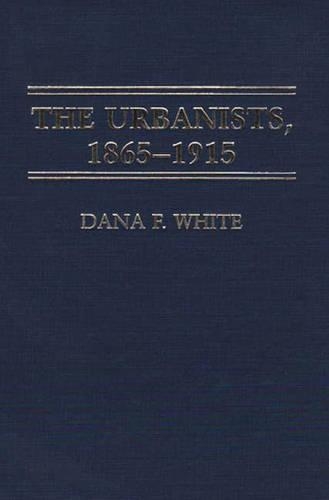
The Urbanists, 1865-1915
(Hardback)
Publishing Details
The Urbanists, 1865-1915
By (Author) Dana F. White
Bloomsbury Publishing PLC
Praeger Publishers Inc
26th April 1989
United States
Classifications
Tertiary Education
Non Fiction
307.760973
Physical Properties
Hardback
302
Description
Based on a reading of almost 6,000 entries from 37 periodicals published between the years 1865 and 1900, The Urbanists offers an insightful analysis of the development of an urban frame of mind. Drawing on the writings of such major figures of nineteenth-century and early-twentieth-century urban America as Frederick Law Olmsted, Daniel H. Burnham, W.E.B. Du Bois, and Robert E. Park, as well as their lesser-known contemporaries, the study combines a number of customarily specialized perspectives: those of the urban designer, the social scientist, the administrator, the politician, the reformer, and the general observer of the city scene. The most comprehensive collection of observations on the period's rapidly expanding urban world, as expressed by its own chroniclers in periodicals of the times, this study highlights the rise of urban self-consciousness into the twentieth century. The volume opens with a background chapter on civic concerns expressed during the two decades following the Civil War and proceeds to four chapters detailing the full range of urban affairs during the final fifteen years of the century. In addition, a series of shorter interludes, each more narrowly focused, supplements the sweep of the periodical literature provided in the chapters with close-up readings from major texts of the era. In conclusion, the book suggests that the basic outlines of modern urban theory were set for subsequent generations by the first urbanists who emerged during the late 1800s. The most comprehensive first-hand account of urban change, this important contribution to urban studies will provide valued reading for students of U.S. and urban studies, American studies, city planning, landscape architecture, and public policy.
Reviews
There is consensus that the period between 1865 and 1915 marked the transition of the US from a rural to an urban society. One often wonders how those who lived through such a major historical shift experienced, recognized, and described it. White has assembled from 37 journals, magazines, and newspapers a wide range of commentary among the contemporaries of this period. He has organized these materials into five cogent chapters. In each he knits together a massive number of quotations to highlight the central theme of each chapter, with a minimum of editorial comment but often with insightful reflection. It is clear that White enjoyed himself in creating this book; those who are interested in US urban history will find equal enjoyment in reading it. Useful for students and scholars in urban sociology, american studies, and urban history. The book is so readable that its audience should be quite broad and it obviously belongs in any research library.-Choice
"There is consensus that the period between 1865 and 1915 marked the transition of the US from a rural to an urban society. One often wonders how those who lived through such a major historical shift experienced, recognized, and described it. White has assembled from 37 journals, magazines, and newspapers a wide range of commentary among the contemporaries of this period. He has organized these materials into five cogent chapters. In each he knits together a massive number of quotations to highlight the central theme of each chapter, with a minimum of editorial comment but often with insightful reflection. It is clear that White enjoyed himself in creating this book; those who are interested in US urban history will find equal enjoyment in reading it. Useful for students and scholars in urban sociology, american studies, and urban history. The book is so readable that its audience should be quite broad and it obviously belongs in any research library."-Choice
Author Bio
DANA F. WHITE is Associate Professor of Urban Studies at Emory University. He is the co-editor, with V. Kramer, of Olmsted South: Old South Critic/New South Planner(Greenwood, 1979). His articles have appeared in American Studies International, The Journal of Urban History, The Atlanta Historical Journal, and Technology and Culture.
